Did the Maple Leafs miss out on a chance to include Cody Franson in their core going forward? Yesterday’s trade with Nashville has some asking the question.
The Leafs had two additional opportunities to do so: One came after his good season in the short lockout year, and the other was the negotiation before the current season began. Both presented an opportunity to sign Franson to some term at a value reflective of a bargaining position that was weaker then than it is now.
A complete afterthought when the lockout lifted, Franson returned to have a very nice surprise season in 2012-13. He finished an impressive sixth in even strength point production among defencemen, playing mostly with Mark Fraser against checking lines during the regular season, before moving onto the second pairing with Gardiner and looking very capable in the playoffs. He was fourth in power play points per 60 that season and finished eighth in overall scoring among defencemen. With a 45-game sample size and potential for short season flukiness, however, it would only be with the benefit of ample hindsight that anyone could infer the Leafs should have sprung to sign Franson long term at that juncture.
Last season (2013-14), expected to step up into the top-four role full time, Franson was still reasonably productive offensively, but struggled with the adjustment at even strength while lining up against stiffer competition. Heavy feet were exposed at times defensively against speedier, more skilled forwards, beaten too often to the outside, and his even strength point production dropped all the way to 121st in the League. He relied more heavily on the powerplay, which was red hot all year before the Leafs collapse, for his points. It wasn’t the type of response to a tougher workload that would inspire confidence in the viability of a long term contract.
| Season | PP pts/60 | Lg Rank | 5v5 pts per 60 | Lg Rank |
|---|---|---|---|---|
| 2012-13 | 5.91 | 3rd | 1.48 | 6th |
| 2013-14 | 4.04 | 37th | 0.71 | 121st |
| 2014-15 | 4.99 | 12th | 1.14 | 29th |
This season, there’s no doubting Franson started to put it all together on the top pairing with Dion Phaneuf. The two turned out to be an okay match, despite all indications to the contrary given how poorly the two ended the season as the first powerplay D unit the year previous. They famously gave up two shorthanded goals against in one game during the 2013-14 collapse, and were routinely exposed for a combined lack of mobility by faster penalty killers if a turnover developed high in the zone on a Leaf powerplay. As it turned out, with both on their strong sides, the two played the game at a similar pace, able to slow things down and move the puck reasonably well, stringing some decent games together. Franson has not played as well with either Morgan Rielly or Jake Gardiner as a partner, and it seems he can be exposed if his partner is pushing the tempo and taking chances, a circumstance in which he has to be leaned on as the defensive presence. While the team is in such disrepair that it is tough to evaluate anything with confidence, he hasn’t looked as good since Dion Phaneuf went down to injury.
The challenge in considering Franson’s eligibility as a core piece is projecting where he slots in on a good team. The Leafs haven’t had answers in the big matchups, but parsing where the blame lies is difficult; relative possession stats suggest Franson was coping with top pairing minutes and competition fairly well this season. The Leafs have never gotten their team defence to a level that could be deemed anything close to acceptable, which makes it particularly hard to evaluate overburdened defencemen the last several seasons. Would it be fair to project him as a competent number four on the right side of a second pairing on a decent team? This is just an opinion, but I don’t see him as anything more than that going forward.
How Franson is going to age, with hip problems in the past that have affected his pivoting ability and overall agility, and if there’s sound sense in signing defencemen long term into their thirties when they aren’t good skaters, are the other bigger picture considerations, and neither fall in favour of giving Franson the deal he wanted to ensure he didn’t go hunting for max dollar in unrestricted free agency.
What is clear to me is that timing, more than anything, made this deal necessary. Even if Franson is a piece that would have been nice to keep, did it make sense to commit big dollars to him long term at age 28, when he’d probably be past his peak by the time the Leafs could reasonably, hypothetically carve out a contention window? Even putting aside cap crunch considerations, I don’t think the Leafs, in their current position, could justify offering more term and dollars, certainly not more term anyway, than this:
https://twitter.com/RealKyper/status/566999832238125058
The positive slant on this deal is that the Leafs took a player they grabbed off of Nashville in exchange for Brett Lebda, in a creative bit of management by Brian Burke, and turned it into a first round draft selection four years later when the team’s evolution has reached a failed denouement. The Leafs signed Santorelli for nothing, acquired Franson for next to nothing, and given they weren’t a good team and going nowhere fast, managed to flip them into two nice pieces for the future. It’s essentially the anti-Dave Bolland situation, where the team gave up two mid level picks including a 2nd rounder, ended up finishing seventh last, and let him walk after playing 23 games in a Leaf jersey.
The reality is that you’re content if Brendan Leipsic turns out as good as Santorelli and a late first round pick as good as Franson, but there’s always the chance they get a player with better upside than both, and at the end of the day this is the nature of rebuilding: Both were good players and not a part of the problem, but prime-aged players, on expiring contracts, ready to help a team win now go out the door, and picks and prospects are added to the fold.
Dealing the team’s first or second best defenceman this season for futures is the official first signal the Shanahan rebuild has begun. What’s next?
Hearing Leafs actively accelerating process of trading Tyler Bozak. Wide variance of opinion on him (not shocking) from many NHL mgmt types.
— Greg Brady (@gregbradyTO) February 15, 2015

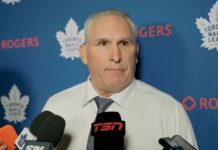

![Craig Berube on Easton Cowan rejoining the Leafs: “He’s given us some really good games… The [demotion] was just a move made for roster reasons, but he’s back” Craig Berube, Toronto Maple Leafs head coach](https://mapleleafshotstove.com/wp-content/uploads/2025/04/berube-craig-leafs-prac-218x150.jpg)
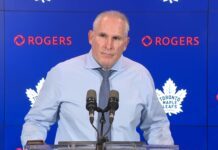


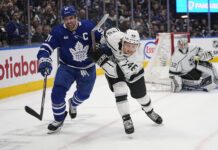
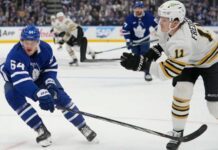



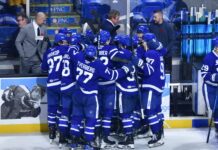
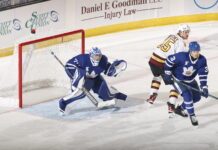
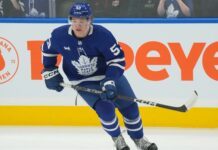
![John Gruden after the Leafs prospects’ 4-1 win over Montreal: “[Vyacheslav Peksa] looked really comfortable in the net… We wouldn’t have won without him” John Gruden, head coach of the Toronto Marlies](https://mapleleafshotstove.com/wp-content/uploads/2025/09/gruden-post-game-sep-14-218x150.jpg)
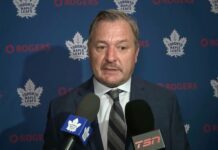
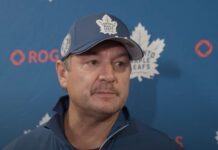



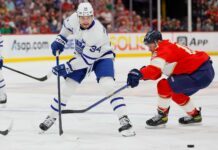


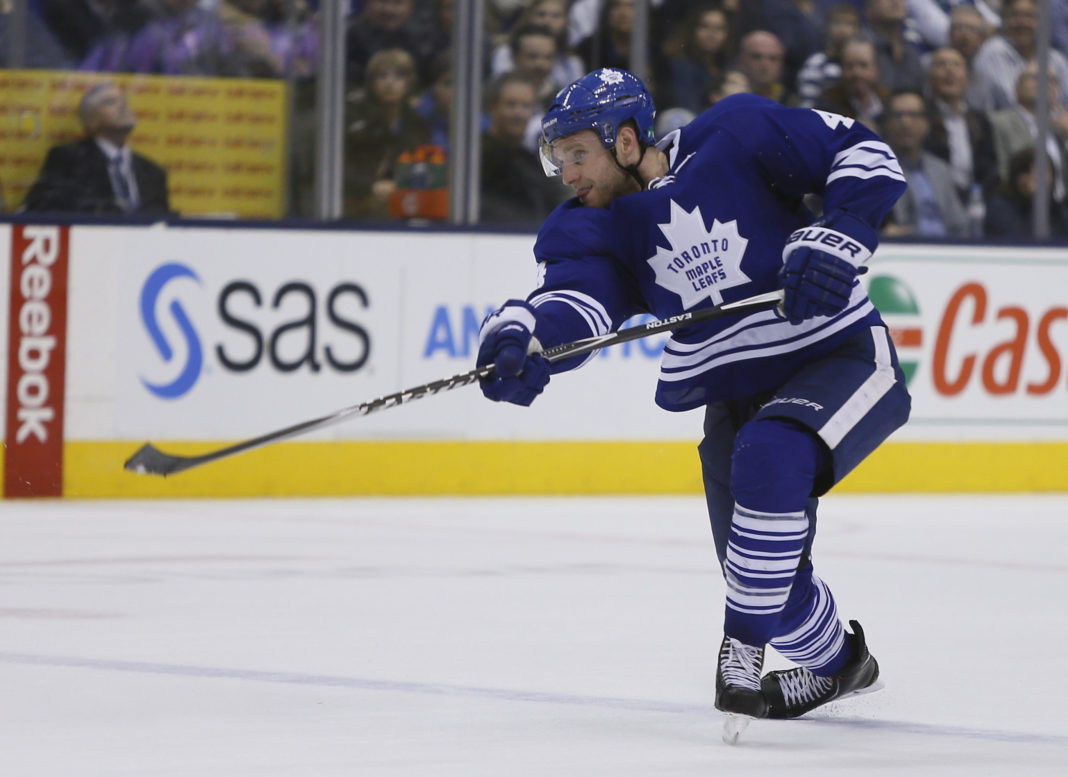
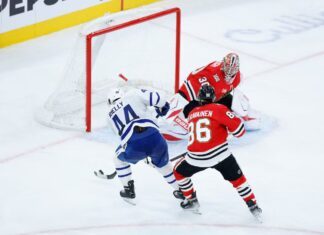



![Craig Berube on Easton Cowan rejoining the Leafs: “He’s given us some really good games… The [demotion] was just a move made for roster reasons, but he’s back” Craig Berube, Toronto Maple Leafs head coach](https://mapleleafshotstove.com/wp-content/uploads/2025/04/berube-craig-leafs-prac-100x70.jpg)




